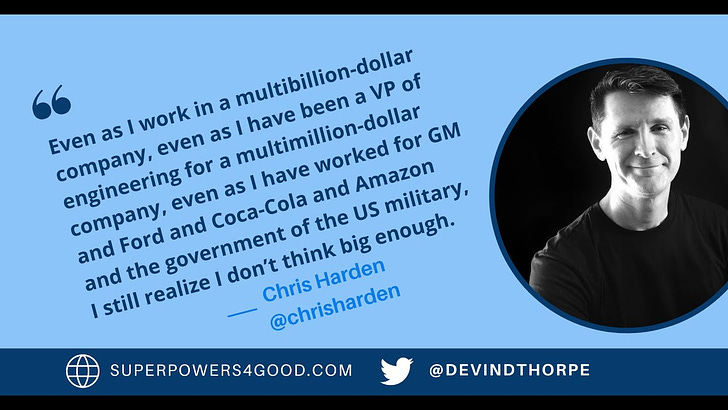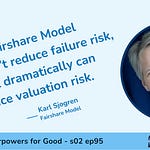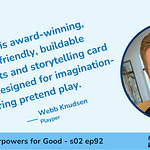Note: as I explained yesterday, this will be the last fresh podcast of October. I’ll share some “best of” episodes over the next few weeks, and I’ll see you in November.
Devin: What do you see as your superpower?
Chris: My superpower, lifelong, has been I’m extremely diverse. So I grew up as an artist, an illustrator. I got inspired by Stan Lee. I got my first comic book when I was six, Spider-Man. It just sent me on this journey of creativity, drawing and illustration. I also happen to be good at math and science, so I went into engineering. I’ve grown up as someone who has really great artistic skills—graphic design. Professionally, I also write, and I’ve done film, and I’m an engineering manager, director, and VP, so I’m really technical. What this enables me to do is talk with almost—not perfectly—but almost any walk of life. I can have something to discuss with people.
Chris Harden has created a family game for Christmas built around a children’s book he wrote that teaches values along with diversity and inclusion. Stanley and the Candy Cane Wormhole Game is now available for pre-order on Kickstarter.
After working on the story for three years, taking great care to test the associated game with 95 different families, Chris is bringing the game to market.
The story’s lead character is a blue squirrel who unlocks Santa’s wormhole, randomly collecting seven gifts that must be returned. As the squirrel works to return the gifts in what becomes a treasure hunt for the participating kids, parents can teach essential values.
The game includes candy, making it a guaranteed hit with little ones.
Chris also took care to incorporate diversity and inclusion into the book.
Having been raised in the South, Chris remembers the racial tension. Visits home remind him that the problem persists.
“When I go home, inappropriate words are used, and the tension between races is strong,” Chris says. “I’m a Caucasian American, and I lived with lots of African Americans in my neighborhood, had lots of wonderful, lifelong friendships, but that racial tension was always there.”
“I was so fortunate God was able to put me into a math and science school for 11th and 12th grade down in Mobile,” he says. “That was the first time I got to see more diverse culture and exposure. Then I went to Auburn, which is very diverse.”
That personal experience motivates Chris’s desire to help children value diversity and inclusion.
Shark Tank Experience
Chris was on Shark Tank a few years ago (after being on this show), pitching his children’s storybook reading robot Trobo. He got a deal done on air, too.
Recently, Chris attended a Shark Tank reunion and shared this report:
I went there expecting to see 50 people. And there were somewhere between 150 and 200 that showed up. I had no idea how big it was going to be. We had some of the most successful Shark Tankers ever there and keynote speeches and that kind of stuff. Everyone was super nice and super friendly because we all have gone through a very similar experience on Shark Tank.
He learned a powerful lesson, he says, from the experience. “Even as I work in a multibillion-dollar company, even as I have been a VP of engineering for a multimillion-dollar company, even as I have worked for GM and Ford and Coca-Cola and Amazon and the government of the US military, I still realize I don’t think big enough.”
Chris has used a rare superpower to build a career. He has a diverse portfolio of skills, talents and abilities that together have become his superpower. He calls it his diversity. I’ll call it personal diversity to distinguish it from our discussion of diversity and inclusion.
How to Develop Personal Diversity As a Superpower
Chris cautions that his superpower has a downside. “The weakness is that if I take the context and switch it, the weakness is I know just knowing myself, I will never be like the world’s expert at anything. I’ll never get there because I spend my time learning too many other things.”
Still, the power of his ability is easy to demonstrate. “Because I can draw and I have an MBA, I learned tools like Visio and Flows. I can take a classic, high-tech engineering conversation and translate it into things that savvy business people can comprehend.”
He used that skill to play a vital role in the development of one of my personal favorite technologies: the Coca-Cola Freestyle soda fountain, which has a touchscreen interface that provides access to all of the company’s flavors.
He illustrates the use of his superpower this way:
I can make myself and my teammates in the room check our assumptions. What am I assuming would that feature, say, on a butter knife? I have no idea what a good feature would be. What is everyone else thinking? Let's get in. Let's draw it, do some flows. My ability to draw has enabled me to not just be an engineer who can code and develop but can actually work with a bunch of soft skill types and get alignment. That's the power of communications.
Chris has some suggestions for developing a diversity of skills to help anyone in their career. He describes a Venn diagram with three circles.
The three circles feature 1) technical skills for the job, 2) soft skills, including communications, and 3) professional skills, things like showing up on time for meetings.
For people with managerial responsibility, he adds a fourth circle for leadership.
“I’m looking at my teammates, and I’m trying to help them be the best they can be and the best teammate they can be,” Chris says. “I’m looking for gaps and expectations for hard skills, soft skills and professionalism.”
By following Chris’s example and advice, you can broaden your skill set to create greater personal diversity, allowing you to create a superpower that will help you do more good in the world.
















Share this post